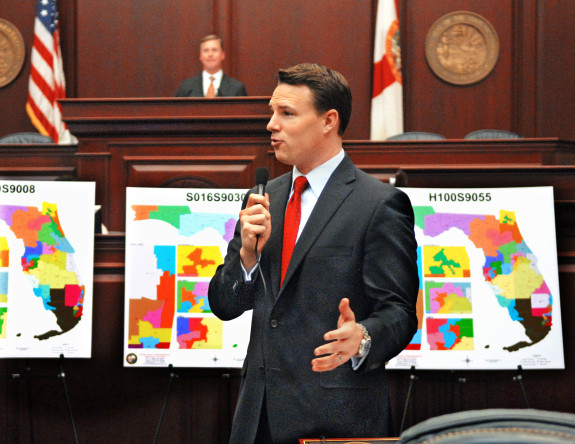
GOP leaders in the Florida Legislature concede some documents from 2012’s redistricting effort have been destroyed. (Photo via Myfloridahouse.gov)
By Ashley Lopez
Florida Center for Investigative Reporting
Florida House and Senate Republican leaders admitted in court filings this week that they destroyed documents related to the Legislature’s constitutionally-mandated redistricting effort in 2012.
This news comes at the heels of a Florida Supreme Court ruling requiring legislators to testify and turn over documents relating to the re-drawn congressional and legislative maps.
The GOP-led Legislature has been in an ongoing legal battle with the League of Women Voters of Florida—as well as other voting rights groups—over this issue.
Back in 2010, voters approved a series of citizen-led ballot measure initiatives called Fair Districts. Among other things, the amendments prohibit state lawmakers from drawing politically-advantageous districts.
However, the League and others allege that they did not follow the intent of the amendments.
During this legal battle, legislators were hoping to use legislative privilege to avoid testifying during the litigation.
The Florida Supreme Court, however, said that couldn’t apply to this case because the constitutional amendments require that there be transparency of how the legislators drew those districts.
According to the News Service of Florida,
The landmark, 5-2 ruling was the first time the justices have recognized a “legislative privilege” in Florida. But it came as something of a pyrrhic victory for lawmakers who were hoping to avoid testifying about the 2012 redistricting process.
Instead, the court found that the need to enforce anti-gerrymandering redistricting standards approved by voters in 2010 outweighed the damage that could be done by forcing lawmakers to testify.
“We therefore reject the Legislature’s argument that requiring the testimony of individual legislators and legislative staff members will have a ‘chilling effect’ among legislators in discussion and participation in the reapportionment process, as this type of ‘chilling effect’ was the precise purpose of the constitutional amendment outlawing partisan political gerrymandering and improper discriminatory intent,” Justice Barbara Pariente wrote for the court.
She was joined by Justices R. Fred Lewis, Peggy Quince, Jorge Labarga and James E.C. Perry. The five justices who backed Friday’s opinion often make up the majority when the court is divided.
Pariente’s opinion upheld a provision of a ruling by Leon County Circuit Judge Terry Lewis that drew a distinction between testimony about lawmakers’ “thoughts or impressions” about the maps — which would still be privileged — and other testimony, which wouldn’t.
Since then, lawmakers have been required to turn over more information about last year’s redistricting process. But, according to court filings, some of that information was destroyed.
According to the Orlando Sentinel, the League and others “notified a Leon County court Wednesday that they intended to place House and Senate officials under oath to find out what documents were destroyed and why.”
The Sentinel reported:
But House Speaker Will Weatherford, R-Wesley Chapel, shot back that the “accusation that the Florida House … thwarted the law and destroyed documents is completely false.”
“The opponents in this lawsuit have received thousands and thousands of documents,” Weatherford said. “They should know better.”
…In two separate series of questions dating back to last year, the plaintiffs’ lawyers peppered the Legislature’s lawyers with questions about the records they wanted, which include e-mails from lawmakers’ campaign accounts and text messages, voicemail or other electronic communications to and between political consultants and state and national Republican committees.
The Legislature has argued it did not have to provide such information under its own record-retention rules, but had nonetheless asked lawmakers to search for such correspondence.
In October, House and Senate lawyers denied any records “were deleted, destroyed, lost, misappropriated, or otherwise … unavailable for production.”
But in a revised response to the interrogatories filed Wednesday in Leon County Circuit Court, the Legislature changed its answer and admitted that some records created during the 2012 legislative session were destroyed — per the legislative bodies’ standard policy for record retention.
For now, League of Women Voters of Florida President Deirdre Macnab has said her legal team is looking into what to do next.
According to The Tampa Bay Times/Miami Herald, “federal rules prohibit document destruction when a party has a reasonable sense that the records could become part of the case and Florida lawmakers have known that a lawsuit challenging their maps was highly likely.”
The next step, legal experts say, is to determine how permanent the Legislature’s destruction of documents is and whether anything significant was destroyed. The challengers may have to hire a forensic computer expert to dig deep into the House and Senate computer servers to uncover evidence of legislative intent, said Gerry Hebert, a former Justice Department lawyer who is representing the League of Women Voters in the Florida case.
It took forensic computer analysts to discover pivotal documents in a Texas redistricting case last year, he said. A federal court determined that Republican lawmakers in Texas had discriminatory intent when they drew a congressional district and the court invalidated the map.
The key piece of evidence: an email from an attorney for a congressman to the staff member drawing the map for the Texas speaker of the House. He described how he must employ the “nudge factor” to elect a Republican by swapping out high turnout Latino precincts with low turnout precincts but maintaining the ethnic composition.
Hebert has represented challengers and governments in dozens of redistricting cases over six decades and said he always advises his clients, “do not destroy any communications or documents.”
If the Leon County judge presiding over the lawsuit determines lawmakers did draw districts for partisan gain, they may have to re-draw Florida’s districts before the 2014 election.
